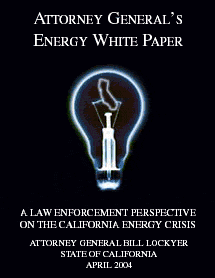Subscribe to Our Newsletter

The Attorney General continues to represent the state in ongoing litigation concerning the 2000-2001 California Energy Crisis.
The Energy Unit represents the state in state and federal litigation, and in administrative proceedings before the Federal Energy Regulatory Commission, in an effort to recover money lost to predatory pricing, fraud, market manipulation, and other unlawful conduct during the crisis, to ensure competitive markets for electricity and natural gas, and to ensure that the People of California have access to reliable energy supplies on a long-term basis. To date, the Unit's work has resulted in the recovery of more than $7 billion.
During the 2000-01 California energy crisis, the electricity market in the Golden State suffered a meltdown due to the unlawful market activities of a variety of energy sellers. Rolling blackouts plunged businesses and residents into darkness, while these sellers reaped unjust and unreasonable electricity rates.
Responding to the crisis, the Attorney General established the Attorney General’s Energy Task Force to investigate and to seek remedies for the harm caused by market manipulation and other unlawful conduct. This Task Force later became the Energy Unit of the Corporate Fraud Section.
Taking action against power generators and traders for unfair business practices, commodities fraud, and antitrust violations, the task force filed dozens of lawsuits and worked to undo price-gouging long-term contracts that California had signed under duress in the midst of the crisis.
The task force further pressed the Federal Energy Regulatory Commission (“FERC”) for billions of dollars in refunds from energy companies that charged unjust, unreasonable rates. Despite legal roadblocks and hurdles thrown up by FERC, the Attorney General has now recovered nearly $7.5 billion from power companies [See chart: Getting Our Money Back.]
In 1999, the first full year of deregulation, California expenditures on wholesale electricity had totaled $7.4 billion. Just one year later, those costs rose 277 percent, to $27.1 billion. In 2001, wholesale prices remained at the exorbitantly high level of $26.7 billion.
The illicit tools energy traders used in their schemes to jack up prices were market-gaming devices bearing such provocative names as Fat Boy, Death Star, Get Shorty, and Ricochet. The evidence shows that various electricity generators and marketers lied to power grid operators and withheld electricity to further increase prices. In audio tapes, Enron even bragged about stealing money from “Grandma Millie” in California.
When California’s investor-owned utilities could no longer afford to pay sky-high wholesale prices, the state stepped in to make sure the lights stayed on. Energy companies then proceeded to hold up the state, both in the day-to-day market and in long-term contracts that sought to guarantee hefty profits. Unfettered by FERC, power generators and traders overcharged California ratepayers by some $9 billion. Some experts put the total damage to California’s economy at more than $40 billion. PG&E went bankrupt, and Southern California Edison came close.
 The Attorney General examined the breakdown in the state’s deregulated energy market from a law enforcement perspective. The review yielded the Attorney General's Energy White Paper: A Law Enforcement Perspective On The California Energy Crisis, pdf that called for major reforms of the legal and regulatory framework that governs California’s wholesale electricity market. The findings concluded that the oversight and enforcement system failed during the energy crisis, worsened the effects of the crisis, and has undermined the ability of ratepayers to obtain redress for price gouging.
The Attorney General examined the breakdown in the state’s deregulated energy market from a law enforcement perspective. The review yielded the Attorney General's Energy White Paper: A Law Enforcement Perspective On The California Energy Crisis, pdf that called for major reforms of the legal and regulatory framework that governs California’s wholesale electricity market. The findings concluded that the oversight and enforcement system failed during the energy crisis, worsened the effects of the crisis, and has undermined the ability of ratepayers to obtain redress for price gouging.